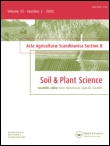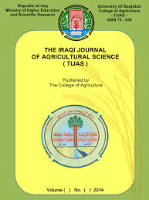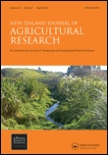
PESQUISA AGROPECUARIA BRASILEIRA
Scope & Guideline
Advancing agricultural knowledge for a sustainable future.
Introduction
Aims and Scopes
- Crop Science and Agronomy:
The journal emphasizes research on various crops, including the improvement of yield, quality, and resistance to diseases through agronomic practices, genetic improvement, and innovative cultivation techniques. - Animal Science and Livestock Management:
Research in this area focuses on improving livestock productivity, health, and welfare through nutritional strategies, breeding, and management practices. - Soil and Environmental Sciences:
Studies on soil management, fertility, and environmental impacts are crucial, addressing sustainability and conservation practices in agricultural systems. - Plant Pathology and Pest Management:
The journal publishes studies on the management of plant diseases and pests, exploring integrated pest management strategies and the development of resistant plant varieties. - Food Science and Nutrition:
Research related to the nutritional quality of agricultural products, food processing, and safety ensures the relevance of agricultural outputs to public health. - Biotechnology and Genetic Engineering:
Innovative studies utilizing biotechnological approaches for crop and livestock improvement are a staple, highlighting advancements in genetic tools and methodologies.
Trending and Emerging
- Sustainable Agricultural Practices:
Research on sustainable agriculture, including organic farming, agroecology, and conservation agriculture, is trending as the need for environmentally friendly practices rises. - Climate Change Resilience:
Studies addressing the impacts of climate change on agriculture, including drought tolerance and adaptation strategies, are increasingly relevant and prevalent. - Precision Agriculture Technologies:
The adoption of precision agriculture, utilizing remote sensing, data analytics, and machine learning for enhanced decision-making, is gaining momentum. - Nutritional Genomics:
Emerging research focuses on the genetic aspects of nutrition in plants and animals, aiming to enhance the nutritional quality of food products. - Food Security and Safety:
Research addressing food security challenges, including postharvest loss prevention and food safety, is becoming more prominent in light of global food supply concerns.
Declining or Waning
- Traditional Crop Breeding Methods:
As modern genetic and biotechnological approaches gain prominence, traditional breeding methods have become less frequently published, indicating a shift towards more innovative methodologies. - Conventional Pest Control Practices:
There is a noticeable decline in studies focusing solely on chemical pest control, as integrated and sustainable pest management strategies gain traction. - Soil Erosion Studies:
Research specifically targeting soil erosion has decreased, possibly due to the increasing focus on broader soil health and sustainability practices.
Similar Journals

ACTA AGRICULTURAE SCANDINAVICA SECTION B-SOIL AND PLANT SCIENCE
Transforming Research into Real-World Agricultural SolutionsACTA AGRICULTURAE SCANDINAVICA SECTION B-SOIL AND PLANT SCIENCE, published by Taylor & Francis AS, is a distinguished journal dedicated to the fields of Agronomy, Crop Science, and Soil Science. With an impressive impact factor, and categorized in Q2 for both Agronomy and Crop Science and Soil Science as of 2023, this journal is an essential resource for researchers, professionals, and students aiming to advance their understanding of soil-plant interactions and sustainable agricultural practices. Operating since 1992 and continuing through to 2024, ACTA aims to publish high-quality, peer-reviewed research that encourages the applicability of advanced scientific knowledge in real-world agricultural settings. While the journal is not open access, it remains widely accessible through institutional subscriptions, reflecting its commitment to disseminating essential findings and fostering innovation in soil and plant science worldwide. Nestled in the vibrant academic environment of Norway, ACTA AGRICULTURAE SCANDINAVICA serves as a key platform for nurturing groundbreaking research that informs sustainable agricultural policies and practices globally.

TROPICAL AGRICULTURE
Unveiling the complexities of Caribbean agriculture.Tropical Agriculture is a reputable journal dedicated to advancing knowledge and research in the fields of Agronomy and Development, with a particular emphasis on tropical farming practices and agricultural innovation. Published by the University of the West Indies, this journal serves as a crucial resource for researchers, professionals, and students engaged in the complexities of agriculture in the tropics. Established in 1979, it has witnessed significant contributions and continues to facilitate scholarly discussions through its quarterly publications. While the journal currently holds a Q4 ranking in both the Agronomy and Development categories, its commitment to fostering research excellence positions it as a pivotal platform for emerging studies and regional agricultural advancements. Although not an open-access publication, it provides critical insights and localized research that greatly benefit the agricultural community, particularly within the Caribbean context. Researchers and professionals in the field can rely on this journal for insightful content on tropical agricultural challenges and developments, enhancing knowledge dissemination and application across related disciplines.

AGRONOMIA MESOAMERICANA
Connecting minds for sustainable agricultural practices.AGRONOMIA MESOAMERICANA is a distinguished open-access journal published by UNIV COSTA RICA, dedicated to advancing knowledge in the fields of agronomy, crop science, food science, and soil science. Since its inception in 1990, the journal has provided a platform for researchers and professionals to disseminate their findings, contributing significantly to the agricultural sciences. With an E-ISSN of 2215-3608, it operates from Costa Rica, specifically from the Centro Investigaciones Agronómicas, situated in San José. Despite its current classification in the Q4 quartile for 2023 in the respective fields, it aims to stimulate academic discourse and inspire innovative solutions to pressing agricultural challenges. The journal attracts a diverse audience and encourages submissions that focus on sustainable practices, food security, and environmental stewardship, making it an essential resource for researchers, professionals, and students alike seeking to enrich their understanding and share crucial insights in the agronomy landscape. Open access ensures that all published research is freely available, fostering collaboration and knowledge exchange worldwide.

PAKISTAN JOURNAL OF AGRICULTURAL SCIENCES
Nurturing Innovation in Agronomy and BeyondWelcome to the Pakistan Journal of Agricultural Sciences, a prominent platform for disseminating vital research findings in the fields of agronomy, crop science, food science, plant science, and soil science. Published by the prestigious University of Agriculture in Faisalabad, this journal aims to enhance the scientific discourse surrounding agricultural innovation and sustainability in Pakistan and beyond. With an ISSN of 0552-9034 and E-ISSN of 2076-0906, the journal serves as a valuable resource for researchers, professionals, and students interested in cutting-edge agricultural developments. As of 2023, the journal is ranked in the Q3 category for Agronomy and Crop Science as well as Food Science and positioned in Q4 for Plant and Soil Science, highlighting its growing impact within a competitive academic landscape. While the Pakistan Journal of Agricultural Sciences is not currently open access, it provides a comprehensive archive of research converging from 2011 to 2024, ensuring that critical knowledge remains accessible to those striving to advance the agricultural sciences. Join us in our mission to foster innovation and support sustainable practices in agriculture.

JOURNAL OF HORTICULTURAL SCIENCE & BIOTECHNOLOGY
Unlocking the potential of plants through scientific discovery.JOURNAL OF HORTICULTURAL SCIENCE & BIOTECHNOLOGY, published by Taylor & Francis Ltd, stands as a prestigious platform in the realms of both horticulture and biotechnology. With an ISSN of 1462-0316 and an E-ISSN of 2380-4084, this journal showcases cutting-edge research that advances our understanding of plant science and genetic innovation. Operating under the publication umbrella from 1996 to 2024, the journal has achieved notable rankings, placing in the Q3 quartile for Genetics and Q2 for Horticulture in 2023. With a Scopus ranking of #25/115 in Agricultural and Biological Sciences (Horticulture) and a respectable 78th percentile, it is highly regarded among researchers and professionals alike. While currently not designated as Open Access, the journal remains crucial for academics keen on disseminating groundbreaking findings and techniques that foster advancements in agricultural productivity and sustainability. As an essential resource for researchers, professionals, and students, JOURNAL OF HORTICULTURAL SCIENCE & BIOTECHNOLOGY not only facilitates knowledge sharing within its community but also serves as a vital reference point for future innovations in the field.

REVISTA DE LA FACULTAD DE CIENCIAS AGRARIAS
Exploring the Frontiers of Agronomy and Plant Science.REVISTA DE LA FACULTAD DE CIENCIAS AGRARIAS is an esteemed academic journal published by UNIV NACIONAL CUYO, FAC CIENCIAS AGRARIAS, located in Chacras de Coria, Mendoza, Argentina. As a pivotal publication in the fields of Agronomy and Plant Science, it has achieved a commendable Q2 ranking in both categories, indicating its relevance and impact within the scientific community. Since its establishment as an Open Access journal in 2007, it has facilitated the dissemination of crucial research, fostering collaboration and innovation among researchers, professionals, and students alike. The journal's converged years from 2008 to 2024 allow it to present contemporary advancements and discussions related to agricultural practices and plant sciences. With a strong commitment to quality and accessibility, REVISTA DE LA FACULTAD DE CIENCIAS AGRARIAS provides a valuable platform for those engaged in the crucial exploration of sustainable agricultural methodologies and plant innovations.

Iraqi Journal of Agricultural Sciences
Cultivating knowledge, nurturing progress.The Iraqi Journal of Agricultural Sciences, published by the College of Agricultural Engineering Sciences, University of Baghdad, is a prominent open-access journal that has been disseminating valuable research in the fields of agricultural and biological sciences since 2005. With an ISSN of 0075-0530 and an E-ISSN of 2410-0862, this journal serves as an essential platform for scholars to share their findings and advancements in various disciplines, including animal science, horticulture, and food science. Recognized for its excellence, the journal achieved Q1 ranking in multiple categories, reflecting its significant contribution to the scientific community and its impact within Scopus rankings. It is particularly dedicated to fostering research that addresses local and global agricultural challenges and promotes sustainable practices in Iraq and beyond. As a pivotal resource for researchers, professionals, and students alike, the Iraqi Journal of Agricultural Sciences invites submissions that advance our understanding of agricultural sciences while supporting the open dissemination of knowledge in this vital sector.

Pesquisa Agropecuaria Tropical
Driving excellence in agricultural science since 1971.pesquisa Agropecuaria Tropical is a premier Open Access journal dedicated to advancing the knowledge and practices within the field of agronomy and crop science. Since its inception in 1971, this peer-reviewed journal, published by the Universidade Federal de Goiás, has played a pivotal role in disseminating high-quality research from Brazil and beyond. Operating under an Open Access model, it ensures that scholarly articles are freely accessible, thereby fostering greater collaboration and innovation. With a Scopus ranking placing it in the 32nd percentile among its peers in agricultural and biological sciences, and a current classification in the Q3 category of agronomy and crop science, the journal serves as an essential resource for researchers, professionals, and students alike. As it continues its publication journey from 2010 to 2024, it remains committed to contributing valuable insights and advancements in the agricultural sector, ultimately influencing sustainable practices and food security.

Crop Forage & Turfgrass Management
Transforming agricultural landscapes with impactful insights.Crop Forage & Turfgrass Management, published by WILEY, serves as an essential platform for researchers, professionals, and students in the fields of agronomy, crop science, plant science, and soil science. With a focus on advancing knowledge in the management of crops, forage systems, and turfgrass, this journal plays a pivotal role in disseminating innovative research and practical applications that drive agricultural sustainability and productivity. Despite its Q3 ranking in various agricultural and biological science categories according to Scopus, it aims to enhance its impact and relevance in the academic community through high-quality publications. As a journal converged from 2015 to 2024, it invites contributions that address contemporary challenges and solutions in crop management, ensuring accessibility to vital knowledge for the advancement of agricultural practices. Situated in the United States, it also reflects the diverse agricultural landscapes and practices of the region, making it a valuable resource for a global audience.

NEW ZEALAND JOURNAL OF AGRICULTURAL RESEARCH
Shaping the Future of Agriculture with Rigorous ScienceNEW ZEALAND JOURNAL OF AGRICULTURAL RESEARCH is a prestigious, peer-reviewed journal published by Taylor & Francis Ltd that has been at the forefront of agricultural science since its inception in 1958. With a strong focus on the fields of Agronomy and Crop Science, Animal Science and Zoology, Plant Science, and Soil Science, this journal has established itself in the academic community, achieving a notable Q2 ranking in various agricultural categories as of 2023. The journal thrives on its commitment to disseminating cutting-edge research and innovative practices that address contemporary challenges in agriculture. Although it does not currently offer an open access option, its valuable contributions can be accessed through various academic platforms, ensuring that vital research reaches a wide audience of researchers, professionals, and students globally. The journal's continued relevance and authority are reflected in its strong Scopus rankings, further emphasizing its role as a critical journal within the agricultural sciences.